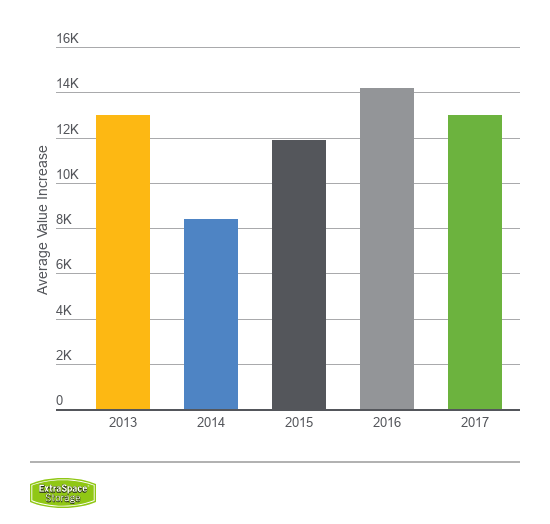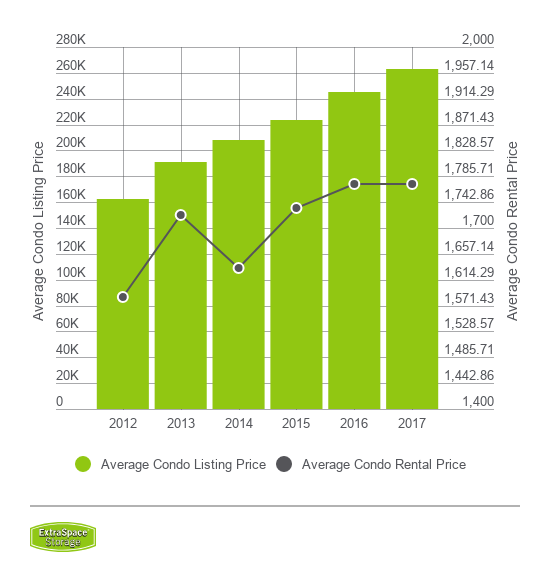Thinking about buying a condo? Depending on your location and the area’s real estate trends, purchasing a condo can be a good or bad investment. To help you make an educated decision, we’ve broken down some of the major questions and factors you’ll want to consider before buying a condominium.
What Is a Condo?
There’s a common misconception that apartments and condos are essentially the same. But unlike an apartment—which is a living space within a building or complex that’s controlled and rented out by a real estate company—a condominium is an individually-owned home within a building or complex.
While a condo building or complex can be managed by a company or an association, it’s similar to owning a house. You go through the buying process with a realtor, pay a mortgage, have a homeowners’ association, and get more control over what goes into your condo and how it looks.
The Good & Bad of Condos
Unless you’ve lived in a condominium before, it’s hard to know what to expect, as condos have more apartment-style communities but with house-like responsibilities. Below are some important advantages and disadvantages of owning a condo that you should know.
The Good
Amenities
With condo living comes great amenities, such as fitness centers, business centers, community gathering spaces, movie theaters, private rooftops, pools and spas, 24-hour concierge services, valet parking services, and more. Of course, condo features aren’t standard across the globe, but you can still expect some form of amenities that go beyond traditional single-family home living.
Community
In many ways, a condominium building or complex is like a small neighborhood. The residents do their part to make the neighborhood the best it can be, and there are communal areas where neighbors can get together for cookouts, meet-and-greets, wine tastings, and other fun activities.
Location
What’s great about condominium complexes is that they’re often built in or around the heart of big cities, meaning residents have prime access to top restaurants, bars, and attractions, as well as sporting and music events. If you’ve ever wanted to be close to the “action,” a condo gives you that opportunity.
Resale Value
Condominium resale values have been increasing since the end of the housing market crisis in 2007. Incredibly, resale values have seen five consecutive years of positive growth, paving the way for buyers and sellers to increase their ROI over a short period of time.

Maintenance
Condominium homeowners’ associations often help take care of maintenance. In fact, many condos have cleaning and maintenance fees built into the normal HOA dues that ensure hallways, entrances, and communal spaces are always clean and welcoming. And since residents don’t have yards or driveways, mowing the lawn and shoveling snow aren’t an issue.
The Bad
Fees
On top of mortgage payments, condo owners have to pay homeowners’ association fees, monthly or annual parking fees, and fees for any additional services that are provided to the community.
Apartment-Style Living
Though condominiums aren’t apartments, they can still be as noisy as apartments. Heavy walkers, loud music or TV, and noisy animals are issues condo owners might encounter (though some HOAs and co-op boards may have stricter ordinances about noise compared to apartment communities).
Parking
If a condominium complex is in a heavily-populated area, residents may be required to pay for garage or lot parking, which can cost hundreds of dollars monthly. Even if residents want to save money by not paying for a parking spot, finding street parking can be tough, especially if street parking is metered.
HOA Rules
Unfortunately, trying to boost the resale value of a condo by making structural, interior, and exterior upgrades may not be possible with rules dictated by the HOA, which are laid out in the Declaration of Covenants, Codes, and Restrictions. Owners can be locked into how spaces look, noise ordinances, and even whether or not pets are allowed in the building.
Small Living Spaces
Young couples and new families living in condos can grow out of these spaces quickly. And thanks to most HOA rules, the chances of increasing space in an existing condo are typically limited.
What About Renting a Condo?
Maybe you don’t feel quite ready to buy your own condo, so you’re thinking about renting. But there’s a problem. Rental costs for condos aren’t always as low as apartment rental costs.
As the average cost to buy has risen, condo rental costs have stagnated at a high price. This trend makes buying that much more alluring.

While this is in no way a call to disregard renting, we do suggest taking a look at helpful rent vs. buy calculators available from both Zillow and Trulia to get a better sense of what may be better for you.
Is the Investment Worth It?
After taking time to look at all of the available condos in your area and determining that a condo would be a better fit financially and location-wise, it’s time to ask yourself: Is buying a condo a good investment?
In our opinion, yes.
One of the strongest indications that now is a great time to buy a condo comes from price trends over the last six years. Prior to 2007, the average cost of a condominium in the U.S. had ballooned to as high as $229,000. By the end of 2011 following the housing crisis, the average condo was selling for just $150,800. However, condominiums have seen a bit of a resurgence since that low point just over six years ago.

With a consistent increase in the average value of condominiums, having nearly rebounded to the 2007 high, buyers and sellers are in a great position to make a return on their investment both today and in the future.
That means buying a condo can be a good investment for individuals, couples, and small families. The downsides you’ll encounter in a condo are similar to what you see with most single-family homes. Fees, community rules, and shrinking space is universal, but the experience of where you live is not.
To get the best return on your investment, though, we recommend you consider these three factors:
- Find condos that allow for upgrades to be made. This can help you boost the asking price when you decide to sell.
- Understand the rules associated with loans from the bank, including FHA Loan approval. After the 2007 housing collapse, loans became far more stringent on condo owners but have begun to ease a little. Do your homework early to ensure you get the best rate possible.
- Don’t be afraid to offer a lower price than what’s asked just like you would with a home. Many sellers are looking to take advantage of the recent price increases, but buyers don’t need to worry. There’s always wiggle room to ensure each party gets the best value.
There are many options available to home buyers these days. Whether you’re looking for a house, townhouse, or a condo, the market is in a great spot for buyers and sellers alike.
Information shown in charts via Zillow.com.



